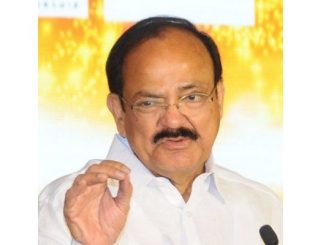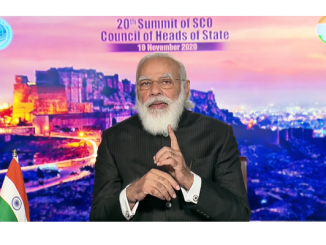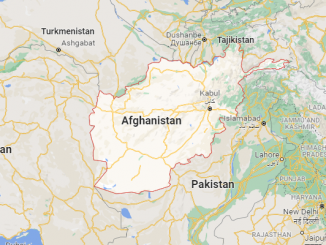
Nov 30: The Vice President of India, Shri M Venkaiah Naidu today expressed his concern about States that leverage terrorism as an instrument of State policy and called upon Shanghai Cooperation Organization (SCO) Member States to enforce internationally recognized legal statutes to comprehensively eradicate safe havens, infrastructure and financial networks supporting terrorism.
Virtually addressing the 19th session of the SCO Council of Heads of Government, hosted by India, the Vice President said India condemns terrorism in all its manifestations. “We remain concerned about threats emerging from ungoverned spaces and are particularly concerned about States that leverage terrorism as an instrument of state policy. Such an approach is entirely against the spirit and ideals and the Charter of the Shanghai Cooperation Organization”, he pointed out.
Stressing that peace was an essential prerequisite for progress, Shri Naidu told the dignitaries participating in the meeting that the most important challenge faced by the region was terrorism, particularly cross-border terrorism. “Terrorism is truly the enemy of humanity. It is a scourge we need to collectively combat”, he added.
He said “elimination of this threat will help us realize our shared potential and create conditions for stable and secure economic growth and sustainable development”.
Observing that the unprecedented Covid-19 pandemic has slowed down the economic trajectory of all Member States, Shri Naidu said India has fought it bravely and has shown remarkable resilience in fighting the virus as well as in ensuring economic stability. He said that a people-empowered and people-driven approach has enabled India to keep its COVID-19 death rate at one of the lowest levels in the world.
Stating that more than 60 percent of the vaccines for global immunization programs are being manufactured in India, he said “Thanks to its world-class pharmaceutical industry, India has demonstrated itself as a ‘pharmacy to the world’ during the ongoing COVID-19 pandemic.”
The Vice President informed the dignitaries that when the whole country was under lock-down, India supplied medicines and equipment to more than 150 countries, including to the Member States of the SCO.
While expressing India’s readiness to share its experience with the SCO Member States in the fight against the pandemic, Shri Naidu said the sociopolitical impact of COVID-19 has exposed the weakness of global institutions.
Emphasizing that this was the time to bring in much-needed reforms to our global institutions, including WHO, and rework our development strategies to face a post-COVID-19 world, the Vice President said: “ For this, we need a Reformed Multilateralism that reflects today’s realities, gives voice to all stakeholders, addresses contemporary challenges and puts human beings at the center of our thought and policies”.
He said India was emerging as an economic force at the global level and the country’s GDP was expected to reach $ 5 trillion by 2025. To ensure stable economic growth, he said India has launched a new economic strategy: Atmanirbhar Bharat or Self-reliant India. “It prioritizes building the national economic strength, resilience and enhanced capacities to be a trusted partner and a responsible global player”, he added.
Underscoring the importance of collective efforts to overcome the ongoing crisis which has exposed the world to vulnerabilities, the Vice President said “Our hope is pinned on trade and investment as an engine of reviving growth and driver of economic recovery. For trade to play its part in the recovery process, all the partners must be trustworthy and transparent”, he pointed out and added and that nations must demonstrate their compliance with multilateral rules of trade.
He also congratulated SCO Trade Ministers for approving the Action Plan for the implementation of the Program of Multilateral Trade and Economic Cooperation for the period 2021-2025.
The Vice President asserted that India was committed to taking its cooperation within SCO to new heights by playing a proactive, positive and constructive role in the organization.
He said that India has proposed to create a Special Working Group on Startups and Innovation. It will lay the foundation for multilateral cooperation among the SCO Member States to develop and hone their startup ecosystems through knowledge-sharing workshops, training young entrepreneurs, enabling access to investors, and exchanging best practices. He said that since the launch of Startup India initiative, India has more than 38,000 recognized startups across 590 districts that have created nearly 400,000 jobs.
India offers to annually host the Special Working Group on Startups and Innovation and also the SCO Startup Forum, he added.
Referring to India’s second proposal to create an Expert Group on Traditional Medicine, he referred to the limitations of modern medical system, which is under tremendous pressure due to the unprecedented global spread of COVID-19 pandemic. “In such a scenario, traditional medicine systems have played an important supporting role in providing effective and low cost alternative to save the lives of millions in the region”, he pointed out.
The Vice President said the creation of an Expert Working Group in Traditional Medicine would effectively help to synergize our efforts in creating a holistic approach to health-care in the Eurasian region.
Observing that Ayurveda and Yoga were playing a crucial role in improving the quality of life of people, he said that India’s Ministry of AYUSH was ready to annually host the Expert Working Group on Traditional Medicine in India under the mechanism of SCO Health Ministers Meeting.
Touching upon the importance of the Micro, Small and Medium Enterprises (MSME) sector in the economic growth of all countries, Shri Naidu said that India, on its part, was ready to share its best practices in this sector. MSMEs not only play a crucial role in providing large scale employment opportunities, but also help in industrialization of rural and backward areas, thereby, reducing regional imbalances, and assuring a more equitable distribution of national income and wealth, Shri Naidu stressed.
He said India’s National Chapter in the SCO Business Council Federation of Indian Chambers of Commerce & Industry (FICCI) has proposed to organize an annual SCO MSME Bazaar and to establish a digital SCO MSME Center.
India’s Minister of External Affairs, Dr S. Jaishankar, Secretary to the Vice President of India, Shri I.V. Subbarao, Secretary (West) at India’s Ministry of External Affairs, Shri Vikas Swarup and other senior officials from MEA participated in the event. From other countries, H.E Mr. Askar Mamin, Prime Minister of Kazakhstan, H.E. Li Keqiang, Premier of the State Council of the People’s Republic of China, H.E. Artem Eduardovich Novikov, Acting Prime Minister of the Kyrgyz Republic, H.E. Andleeb Abbas, Federal Parliamentary Secretary for Foreign Affairs, Pakistan, H.E. Mikhail Mishustin, Prime Minister of the Russian Federation, H.E. Mr. Qohir Rasulzoda, Prime Minister of the Republic of Tajikistan, H.E. Abdulla Nigmatovich Aripov, Prime Minister of Uzbekistan, H.E. Amrullah Saleh, 1 st Vice President of Afghanistan, H.E. Golovchenko Roman, Prime Minister of the Republic of Belarus, H.E. Eshaq Jahangiri, First Vice President of Iran, H.E. SODBAATAR Yangug (Sc. Dr) Deputy Prime Minister of Mongolia, H.E. Mr. Rashid Meredov, Deputy Chairman of the Cabinet of Ministers, Minister of Foreign Affairs Turkmenistan, SCO Secretary-General- H.E. Mr. Vladimir Norov, Director of the Executive Committee of the SCO Regional Anti-Terrorist Structure (RATS) – H.E. Mr. Jumakhon Giyosov, Chairman of the SCO Business Council – Mr. Sergey Katyrin, Chairman SCO Interbank Association- Mr. Igor Shuvalov were among the dignitaries who attended the virtual summit.
Disclaimer: We donot claim that the images used as part of the news published are always owned by us. From time to time, we use images sourced as part of news or any related images or representations. Kindly take a look at our image usage policy on how we select the image that are used as part of the news.


